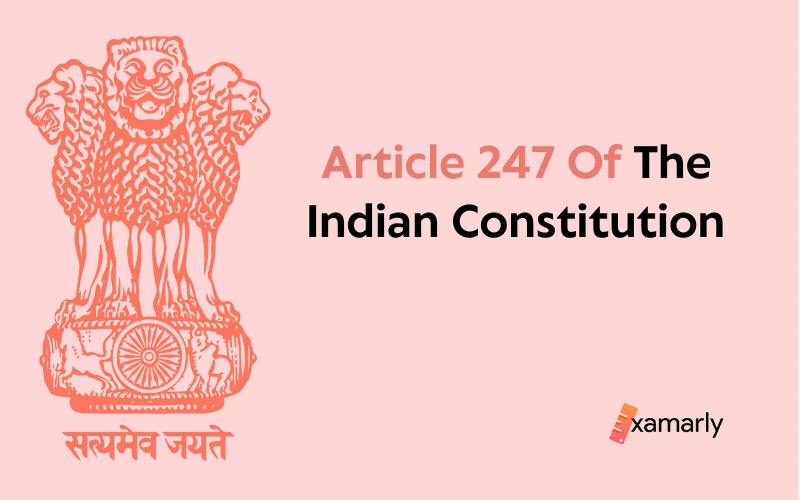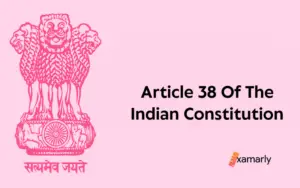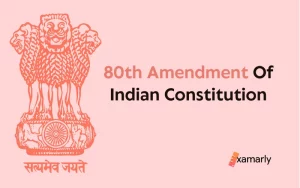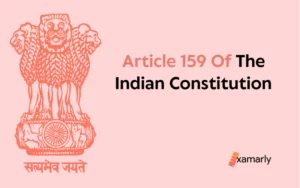Article 247 of the Indian Constitution addresses the authority of Parliament to make provisions for the establishment of certain additional courts.
This composition offers insightful information about Article 247 of the Constitution.
Provisions Of Article 247 Of The Indian Constitution
Despite whatever may be stated in Chapter I of Part XI, Parliament may, by law, allow for the formation of any additional courts for the purpose of improving the administration of laws established by Parliament as well as any existing laws pertaining to anything listed in the Union List.
Establishment Of Additional Courts By Laws Enacted By Parliament
India has advanced significantly. Legal activity has been spurred by several factors, including increased economic development and globalization, as well as legal requirements imposed by numerous international treaties. This has led to the emergence of new and more complicated disputes and conflicts. After the enactment of the legislation, the responsibility of the state does not come to an end. A mechanism that upholds the rights and obligations established as a result of constitutional provisions aiming to achieve social justice is required.
Experience has also demonstrated that new laws establishing new rights and obligations are often passed without considering how much future litigation will be created and without increasing the court system’s bench size in a manner that would enable it to handle the added responsibilities. The case that arose as a result of Section 138 of the Negotiable Instruments Act is an example that exemplifies this point perfectly.
Case Laws – Re: Expeditious Trial of Cases
A five-judge Constitution bench chaired by Chief Justice S. A. Bobde ruled that under the terms of the Negotiable Instruments (NI) Act, the centre has the authority and duty to establish new courts to handle matters involving cheque dishonour. The bench came to the conclusion that the power granted by the aforementioned article is coupled with a responsibility on the part of the central government to oversee the formation of new courts.
In accordance with Article 247, the parliament may issue orders establishing extra courts to handle the cases named in the Union List. In a suo moto case filed to develop strategies for accelerating the proceedings under Section 138 of the Negotiable Instruments Act, which deals with check bounce instances, this preliminary perspective of the bench was noted.
Due to the fact that 30% of all ongoing cases at the trial stage include cheque dishonor, the supreme court took suo moto cognizance of the matter. Previously, when the Central Government requested input on this matter, the Additional Solicitor General sent a note describing alternative procedures that the Union Ministry of Finance recommended be taken to solve the issue.
The SC chose not to put the Union Ministry of Finance’s recommendations into action. A committee made up of Secretaries from different Ministries was formed by the bench’s order to look into the situation. A former judge with substantial trial expertise will serve as chair of the aforementioned committee.
Winding UP
Statistics show that the new courts have made a major contribution to the speedy resolution of conflicts that would have required decades in civil or criminal courts acting alone. The financial burden that would be placed on the government by the establishment of such new courts is an issue that must be addressed once again; yet, as the administration of justice and the welfare of the general public are the primary concerns of the government, it is imperative that every effort be made to bring these courts into existence.
FAQs On Article 247
What Is Article 247 In The Constitution Of India?
According to Article 247 of the Indian Constitution, the Indian Parliament has the power to make provisions for the formation of additional courts.
What Is Part IX Of The Constitution Of India?
Part IX deals with the Article that set forth the provisions revolving around the relations between the Union and the States.
What Is Chapter 1 Of Part XI Of The Indian Constitution?
Chapter 1 of Part XI deals with the Articles having provisions regarding “Legislative Relations” in the Indian Constitution.






